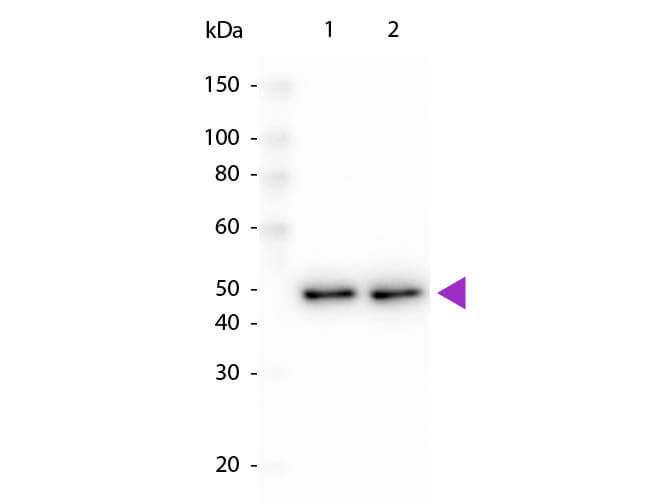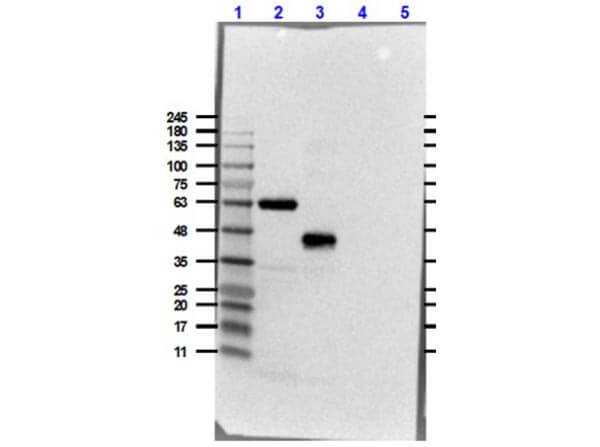Datasheet is currently unavailable. Try again or CONTACT US
DYKDDDDK Tag (Anti-FLAG®) Antibody Peroxidase Conjugated
Rabbit Polyclonal
3 References
600-403-383
100 µg
Lyophilized
WB, ELISA, IF
FLAG-Tag
Rabbit
Shipping info:
$50.00 to US & $70.00 to Canada for most products. Final costs are calculated at checkout.
Product Details
Antibody for the detection of FLAG® conjugated proteins (RABBIT) Antibody Peroxidase Conjugated - 600-403-383
rabbit anti-FLAG antibody peroxidase conjugation, HRP conjugated rabbit anti-FLAG antibody, anti-Flag tagged, anti-DYKDDDDK
Rabbit
Peroxidase (HRP)
Polyclonal
IgG
Target Details
FLAG-Tag
Conjugated Peptide
This antibody was purified from whole rabbit serum prepared by repeated immunizations with the Enterokinase Cleavage Site (ECS) peptide DYKDDDDK (Asp-Tyr-Lys-Asp-Asp-Asp-Asp-Lys) conjugated to KLH using maleimide. This antibody reacts with FLAG conjugated proteins.
This affinity purified antibody is directed against the FLAG™ motif and is useful in determining its presence in various assays. This polyclonal anti-FLAG™ tag antibody detects over-expressed proteins containing the FLAG™ epitope tag at either the N or C terminus. In western blotting of bacterial extracts the antibody does not cross-react with endogenous proteins.
Application Details
ELISA, WB
IF
- View References
This antibody is optimally suited for monitoring the expression of FLAG™ tagged fusion proteins. As such, this antibody can be used to identify fusion proteins containing the FLAG™ epitope. The antibody recognizes the epitope tag fused to the amino- and carboxy- termini of targeted proteins. This antibody has been tested by ELISA and western blotting against both the immunizing peptide and FLAG™ containing recombinant proteins. Although not tested, this antibody is likely functional for immunoprecipitation and immunocytochemistry, and other immunodetection techniques. The epitope tag peptide sequence was first derived from the 11-amino-acid leader peptide of the gene-10 product from bacteriophage T7. Now the most commonly used hydrophilic octapeptide is DYKDDDDK. Rockland Immunochemical's polyclonal antibody to detect FLAG™ conjugated proteins binds FLAG™ containing fusion proteins with greater affinity than the widely used monoclonal M1, M2 and M5 clones, and shows greater sensitivity in most assays. Affinity purification of the polyclonal antibody results in very low background levels in assays and low cross-reactivity with other cellular proteins.
Formulation
1.0 mg/mL by UV absorbance at 280 nm
0.02 M Potassium Phosphate, 0.15 M Sodium Chloride, pH 7.2
0.01% (w/v) Gentamicin Sulfate. Do NOT add Sodium Azide!
10 mg/mL Bovine Serum Albumin (BSA) - Immunoglobulin and Protease free
100 µL
Restore with deionized water (or equivalent)
Shipping & Handling
Ambient
Store vial at 4° C prior to restoration. For extended storage aliquot contents and freeze at -20° C or below. Avoid cycles of freezing and thawing. Centrifuge product if not completely clear after standing at room temperature. This product is stable for several weeks at 4° C as an undiluted liquid. Dilute only prior to immediate use.
Expiration date is one (1) year from date of receipt.
Epitope tags are short peptide sequences that are easily recognized by tag-specific antibodies. Due to their small size, epitope tags do not affect the tagged protein’s biochemical properties. Most often sequences encoding the epitope tag are included with target DNA at the time of cloning to produce fusion proteins containing the epitope tag sequence. This allows anti-epitope tag antibodies to serve as universal detection reagents for any tag containing protein produced by recombinant means. This means that anti-epitope tag antibodies are a useful alternative to generating specific antibodies to identify, immunoprecipitate or immunoaffinity purify a recombinant protein. The anti-epitope tag antibody is usually functional in a variety of antibody-dependent experimental procedures. Expression vectors producing epitope tag fusion proteins are available for a variety of host expression systems including bacteria, yeast, insect and mammalian cells. Rockland Immunochemicals produces anti-epitope tag antibodies against many common epitope tags including Myc, GST, GFP, 6X His, MBP, FLAG™ and HA. Rockland Immunochemicals also produces antibodies to other tags including FITC, Rhodamine (TRITC), DNP and biotin.
Nguyen TV et al. (2017). p97/VCP promotes degradation of CRBN substrate glutamine synthetase and neosubstrates. Proc Natl Acad Sci USA.
Applications
WB, IB, PCA
Saxon et al. (2016). p52 Overexpression Increases Epithelial Apoptosis, Enhances Lung Injury, and Reduces Survival after Lipopolysaccharide Treatment. Journal of Immunology
Applications
TUNEL
Benjamin et al. (2016). Epithelial-Derived Inflammation Disrupts Elastin Assembly and Alters Saccular Stage Lung Development. The American Journal of Pathology
Applications
WB, IB, PCA
This product is for research use only and is not intended for therapeutic or diagnostic applications. Please contact a technical service representative for more information. All products of animal origin manufactured by Rockland Immunochemicals are derived from starting materials of North American origin. Collection was performed in United States Department of Agriculture (USDA) inspected facilities and all materials have been inspected and certified to be free of disease and suitable for exportation. All properties listed are typical characteristics and are not specifications. All suggestions and data are offered in good faith but without guarantee as conditions and methods of use of our products are beyond our control. All claims must be made within 30 days following the date of delivery. The prospective user must determine the suitability of our materials before adopting them on a commercial scale. Suggested uses of our products are not recommendations to use our products in violation of any patent or as a license under any patent of Rockland Immunochemicals, Inc. If you require a commercial license to use this material and do not have one, then return this material, unopened to: Rockland Inc., P.O. BOX 5199, Limerick, Pennsylvania, USA.


